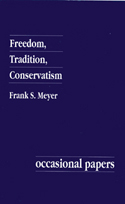
The demise of socialist dogma has brought to the fore some underlying tensions between its opponents, above all between liberal and conservatives. These differences were explored by Frank S. Meyer, the American conservative writer, in the 1960s. This CIS Occasional Paper reproduces an essay of his first published in 1960. In it, Meyer argues that the ‘libertarian’ and the ‘traditionalist’ opponents of socialism (or what he called ‘collectivist Liberalism’) have exaggerated their differences.
Western civilisation embodies a balance between, on the one hand, the freedom, rationality and individuality valued by libertarians, and, on the other, the virtue, continuity and organic order valued by traditionalists. ‘The history of the west has been a history of reason operating within tradition…The projection of a sharp antithesis between reason and tradition distorts the true harmony which exists between them and blocks the development of conservative thought.
According to Frank Meyer, libertarians need to understand that the political goal of freedom serves the moral end of virtue, which traditionalists should avoid translating their respect for custom and established institutions into illiberal politics.











